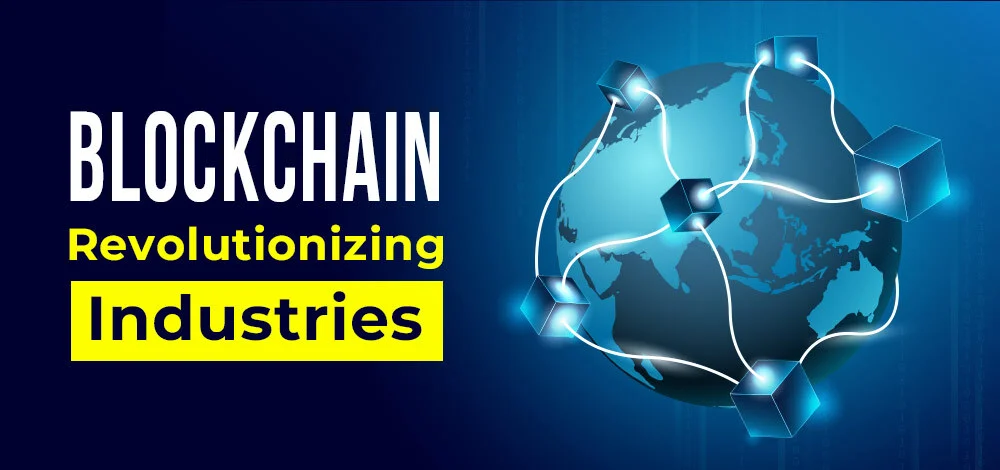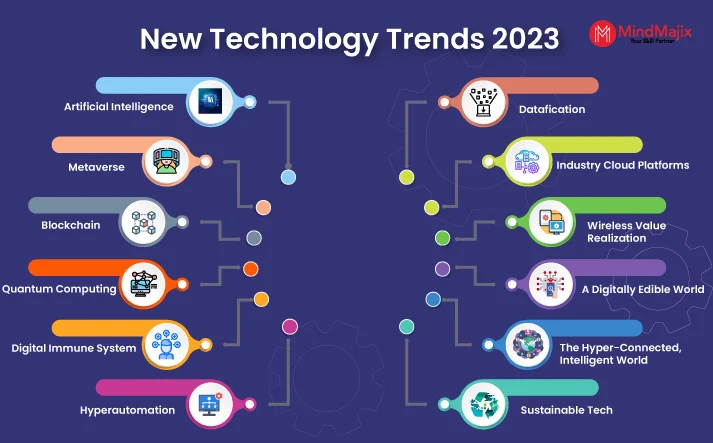Blockchain technology has been a game-changer in various industries, revolutionizing the way businesses operate. How Blockchain is Revolutionizing Various Industries is evident in sectors such as finance, healthcare, supply chain management, and real estate. The decentralized and secure nature of blockchain has made it a popular choice for businesses looking to streamline their operations and enhance transparency.
This innovative technology has disrupted traditional financial systems by enabling faster and more secure transactions. In the healthcare industry, blockchain is being used to securely store and share patient data, improving the overall efficiency of healthcare services. Supply chain management has also benefitted from blockchain, as it provides an immutable record of transactions, ensuring the authenticity of products and reducing the risk of fraud. Furthermore, blockchain has the potential to revolutionize the real estate industry by simplifying property transactions and reducing the need for intermediaries.
As blockchain continues to gain traction, its impact on various industries is becoming more apparent. The use of smart contracts, digital identity verification, and tokenization are just a few examples of how blockchain is transforming traditional business processes. Additionally, the integration of blockchain technology with other emerging technologies such as artificial intelligence and the Internet of Things holds promise for even further advancements in different sectors.
1. Banking and Finance
Blockchain technology has revolutionized the banking and finance industry by providing a secure and transparent way to record financial transactions. The decentralized nature of blockchain eliminates the need for intermediaries, reducing transaction costs and processing times. Smart contracts, powered by blockchain, automate and enforce the terms of agreements, streamlining processes such as loan approvals and trade settlements. Additionally, blockchain enables faster cross-border payments and improves the overall security of financial data through its encryption and immutability.
Furthermore, the use of blockchain in the finance sector has opened up opportunities for new forms of fundraising, such as Initial Coin Offerings (ICOs) and Security Token Offerings (STOs). These alternative fundraising methods allow companies to raise capital through the issuance of digital tokens, providing investors with new investment opportunities.
2. Supply Chain Management
Blockchain technology has transformed supply chain management by enhancing transparency, traceability, and efficiency throughout the entire supply chain process. By recording every transaction and movement of goods on a decentralized ledger, blockchain enables stakeholders to track the origins and journey of products, ensuring authenticity and quality control. This level of transparency also helps in detecting and preventing fraud, counterfeiting, and the use of unethical labor practices.
Moreover, blockchain streamlines the documentation process and reduces paperwork by digitizing important records such as invoices, customs documents, and shipping manifests. This not only saves time and resources but also minimizes the risk of errors and discrepancies in the supply chain. Overall, the implementation of blockchain in supply chain management has the potential to revolutionize the industry by optimizing processes and building trust among all participants.
3. Healthcare
Blockchain technology is revolutionizing the healthcare industry by addressing key challenges such as data security, interoperability, and patient privacy. By creating a secure and decentralized system for storing and sharing medical records, blockchain ensures that sensitive patient information is protected from unauthorized access and tampering. This not only enhances data security but also enables healthcare providers to access a patient’s complete medical history from various sources, leading to more informed decision-making and improved patient care.
Additionally, blockchain facilitates the interoperability of healthcare systems by providing a standardized and secure platform for exchanging data between different healthcare organizations. This seamless data exchange promotes collaboration and communication among providers, ultimately enhancing the overall quality of care. Moreover, blockchain-based solutions are being leveraged for managing clinical trials, tracking pharmaceutical supply chains, and ensuring the authenticity of medical devices and supplies.
4. Real Estate
Blockchain technology is revolutionizing the real estate industry by simplifying and securing property transactions, enhancing transparency, and reducing the need for intermediaries. Through the use of smart contracts, blockchain automates the execution of real estate agreements, such as property transfers, rental agreements, and escrow services, thereby streamlining the entire process and eliminating the risk of fraud and disputes.
Moreover, blockchain enables the tokenization of real estate assets, allowing investors to buy and sell fractional ownership of properties. This opens up new avenues for real estate investment and provides liquidity to illiquid assets. Additionally, blockchain-based property registries ensure the accuracy and immutability of land and title records, reducing the potential for fraudulent activities and legal disputes. Overall, blockchain is transforming the real estate industry by making transactions more efficient, secure, and accessible to a wider range of investors.
5. Voting Systems
Blockchain technology is revolutionizing voting systems by addressing issues of security, transparency, and accessibility in elections. By creating a tamper-proof and decentralized ledger for recording votes, blockchain ensures the integrity of the electoral process and prevents fraud or manipulation of election results. Additionally, blockchain-based voting systems enable greater transparency, as voters can verify that their votes have been accurately recorded and counted, enhancing the overall trust in the democratic process.
Furthermore, blockchain technology allows for the development of remote and mobile voting solutions, making it easier for citizens to participate in elections, especially those who are unable to physically visit polling stations. This increased accessibility can lead to higher voter turnout and greater inclusivity in the electoral process. Overall, blockchain is revolutionizing voting systems by providing a secure, transparent, and accessible platform for conducting elections.
6. Intellectual Property Rights
Blockchain technology is revolutionizing the management of intellectual property rights by providing a secure and transparent platform for recording and protecting digital assets. Through the use of blockchain, creators and innovators can establish irrefutable proof of ownership and timestamp their creations, ensuring that their intellectual property rights are protected from infringement and unauthorized use.
Moreover, blockchain enables the implementation of smart contracts for managing licensing agreements, royalty payments, and the distribution of digital content. This automation of intellectual property rights management reduces the potential for disputes and ensures that creators receive fair compensation for their work. Additionally, blockchain-based platforms for digital rights management and content distribution are transforming the way intellectual property is monetized and protected in the digital age.
7. Supply Chain Management
Blockchain technology has revolutionized supply chain management by providing a secure and transparent platform for tracking and tracing the movement of goods and ensuring product authenticity. By recording every transaction and movement of goods on a decentralized ledger, blockchain enables stakeholders to verify the origins, authenticity, and condition of products throughout the supply chain.
Moreover, blockchain facilitates the digitization of important documentation such as invoices, customs declarations, and shipping manifests, reducing paperwork and streamlining the documentation process. This not only saves time and resources but also minimizes the risk of errors and discrepancies in the supply chain. Overall, blockchain is revolutionizing supply chain management by enhancing transparency, traceability, and efficiency in the global movement of goods.
8. Identity Management
Blockchain technology is revolutionizing identity management by providing a secure and decentralized solution for managing digital identities. By creating a tamper-proof and transparent ledger for storing identity information, blockchain enhances the security and privacy of personal data, reducing the risk of identity theft and fraud. Additionally, blockchain enables individuals to have greater control over their personal information and decide who can access it, enhancing data privacy and consent management.
Moreover, blockchain-based identity management solutions have the potential to streamline identity verification processes across various industries such as finance, healthcare, and e-commerce. By providing a standardized and secure platform for verifying identities, blockchain reduces the need for repetitive identity checks and simplifies the onboarding process for new customers and users. Overall, blockchain is revolutionizing identity management by providing a secure, transparent, and user-centric approach to managing digital identities.
9. Energy Trading
Blockchain technology is revolutionizing energy trading by enabling the peer-to-peer exchange of energy resources in a secure and transparent manner. Through the use of blockchain, individuals and organizations can buy, sell, and trade renewable energy directly with each other, bypassing traditional energy suppliers and intermediaries. This decentralized approach to energy trading promotes energy independence, reduces transaction costs, and supports the growth of renewable energy sources.
Furthermore, blockchain facilitates the automation of energy trading processes through smart contracts, which automatically execute the terms of energy agreements, such as pricing, delivery, and settlement. This streamlines the trading process and eliminates the need for middlemen, making energy trading more efficient and cost-effective. Overall, blockchain is revolutionizing energy trading by democratizing the exchange of energy resources and accelerating the transition to a more sustainable and decentralized energy system.
10. Charity and Philanthropy
Blockchain technology is revolutionizing the charity and philanthropy sector by enhancing transparency, accountability, and trust in donation processes. By recording donation transactions on a decentralized ledger, blockchain ensures that funds are allocated and used for their intended purposes, providing donors with greater confidence in the impact of their contributions. Additionally, blockchain enables the tracking of donations throughout the entire supply chain, from donor to recipient, ensuring that funds reach their intended beneficiaries.
Moreover, blockchain-based platforms for charitable giving and philanthropy are streamlining the donation process, reducing administrative costs, and increasing the efficiency of fund distribution. Smart contracts powered by blockchain automate the disbursement of funds based on predefined criteria, ensuring that donations are allocated in a transparent and accountable manner. Overall, blockchain is revolutionizing charity and philanthropy by promoting transparency, accountability, and trust in the donation ecosystem.
| Industry | Impact of Blockchain |
|---|---|
| Finance | Efficient and secure cross-border transactions, reduced fraud and costs |
| Healthcare | Secure and interoperable health data exchange, streamlined processes |
| Supply Chain | Transparent and traceable supply chain, reduced counterfeiting |
| Real Estate | Faster and secure property transactions, reduced fraud and paperwork |
| Education | Secure and verifiable academic credentials, efficient record-keeping |
Blockchain technology is disrupting various industries by providing secure, transparent, and efficient solutions. From finance to healthcare, supply chain to real estate, and education, the impact of blockchain is revolutionizing the way businesses and organizations operate. It is enabling trust, reducing costs, and streamlining processes across different sectors, ultimately leading to a more connected and secure global economy.




